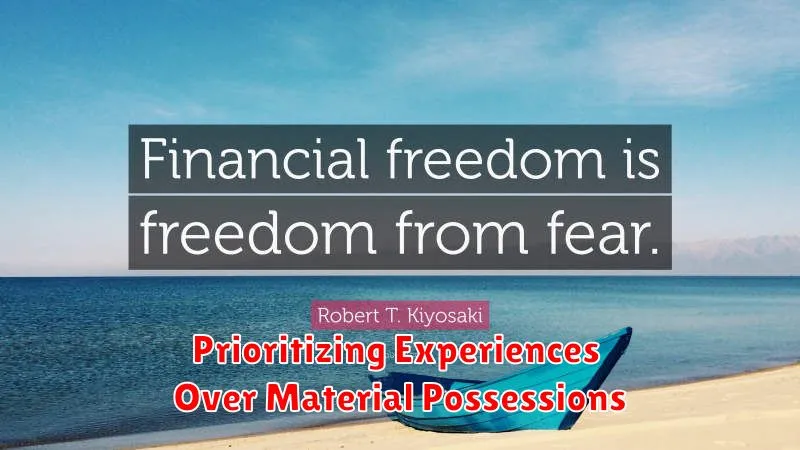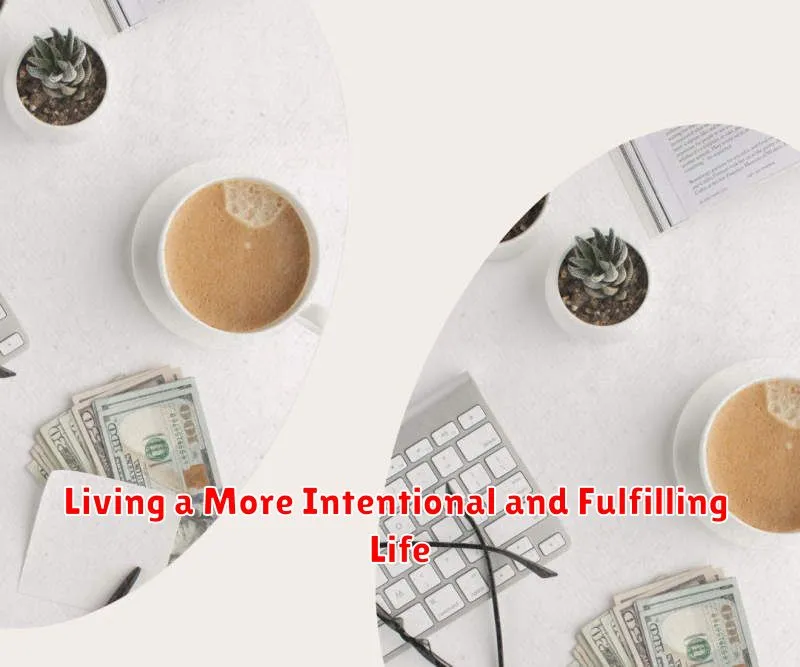Are you tired of living paycheck to paycheck, constantly worrying about money? Do you dream of financial freedom and the ability to pursue your passions without financial constraints? If so, then you need to learn the art of living below your means. This powerful strategy can transform your financial life, setting you on the path to wealth and security. By intentionally spending less than you earn, you take control of your finances, build a solid foundation for the future, and unlock a world of possibilities.
Living below your means is not about deprivation; it’s about prioritizing your financial goals and making smart choices. It’s about making informed decisions, avoiding impulsive spending, and consciously building a lifestyle that aligns with your financial aspirations. This doesn’t mean you have to sacrifice your enjoyment; it’s about finding a balance between spending and saving, ensuring you are living a fulfilling life while securing your financial future.
Understanding Living Below Your Means
Living below your means means spending less than you earn. This might sound simple, but it’s a powerful principle that can significantly impact your financial security. It involves creating a budget that allows you to save and invest a portion of your income consistently.
Instead of keeping up with the Joneses and spending on unnecessary items, you prioritize essential needs and allocate your resources wisely. It’s not about deprivation but about conscious choices that align with your financial goals. By understanding this principle, you take control of your finances and pave the way for a brighter financial future.
Reduced Financial Stress and Anxiety
One of the most immediate and tangible benefits of living below your means is a significant reduction in financial stress and anxiety. When you spend less than you earn, you create a buffer between your income and your expenses, giving you peace of mind and reducing the constant worry about money.
Imagine the relief of not having to stress about making rent or utility payments, knowing you have a comfortable cushion for unexpected expenses. This financial freedom translates into less worry, a clearer mind, and improved overall well-being.
By living below your means, you gain control over your finances, leading to a more relaxed and less anxious state. This can positively impact your relationships, work performance, and overall quality of life.
Increased Savings and Emergency Fund
Living below your means is the cornerstone of financial security, and one of its most immediate benefits is the ability to significantly increase your savings. By spending less than you earn, you create a surplus that can be channeled towards your financial goals. This surplus not only allows you to build a healthy emergency fund, but also opens the door to achieving other financial aspirations, such as investing, paying off debt, or making significant purchases.
An adequate emergency fund is crucial for weathering unexpected life events. Whether it’s a sudden job loss, medical emergency, or home repair, having a financial cushion can prevent you from spiraling into debt and financial stress. By living below your means, you can accumulate savings quickly, building a robust emergency fund that provides peace of mind and financial stability.
The ability to save regularly and build an emergency fund is a direct result of living below your means. It’s a powerful strategy that empowers you to take control of your finances and create a solid foundation for a financially secure future.
Faster Debt Repayment
Living below your means allows you to allocate extra funds towards debt repayment, leading to faster debt reduction. By minimizing unnecessary expenses, you can significantly increase your debt payments. This translates to paying off loans and credit card balances quicker, saving you on interest charges and ultimately freeing up more of your income for other financial goals.
Imagine the satisfaction of seeing your debt balance shrink faster and knowing you’re taking control of your finances. Faster debt repayment not only relieves financial stress but also creates a positive feedback loop. As you eliminate debt, you build financial confidence and become more empowered to make sound financial decisions.
Freedom to Pursue Goals and Dreams
One of the most significant benefits of living below your means is the freedom it provides to pursue your goals and dreams. When you are not constantly stressed about finances, you have the mental and emotional space to focus on what truly matters to you. This could be anything from starting a business, traveling the world, pursuing a passion project, or simply spending more quality time with loved ones.
Imagine being able to take a leap of faith and pursue a career change without the fear of financial instability. Or envision having the flexibility to take a sabbatical to travel or volunteer without the burden of debt. This freedom is a priceless benefit that comes with living below your means. You can finally break free from the shackles of financial constraints and truly live life on your own terms.
Building a Strong Financial Foundation
Living below your means is a fundamental principle for building a strong financial foundation. By consistently spending less than you earn, you create a surplus of funds that can be directed towards achieving your financial goals. This surplus can be allocated to various areas like saving, investing, paying off debt, or pursuing educational opportunities.
The benefits of living below your means extend beyond financial security. It empowers you to gain control over your finances, reducing the stress and anxiety associated with debt and financial instability. This newfound control allows you to make conscious and informed decisions about your money, leading to a sense of empowerment and confidence.
Furthermore, living below your means fosters a mindset of financial discipline and prioritization. It teaches you to differentiate between needs and wants, encouraging mindful consumption and responsible spending habits. This discipline extends beyond your finances, influencing your approach to other aspects of life, promoting a sense of balance and well-being.
Avoiding Debt Traps and Overspending
One of the most significant benefits of living below your means is the ability to avoid debt traps and overspending. When you consistently spend less than you earn, you create a buffer that protects you from financial hardship. This buffer allows you to weather unexpected expenses, such as medical bills or car repairs, without resorting to high-interest debt.
By living below your means, you can avoid the temptation to use credit cards for everyday purchases, which can quickly lead to a cycle of debt. Additionally, you can avoid taking on large loans, such as personal loans or payday loans, that can have exorbitant interest rates and trap you in a cycle of debt.
Instead of relying on debt, you can build a solid financial foundation by saving and investing your money. This allows you to achieve your financial goals, such as buying a home, retiring comfortably, or starting a business, without the burden of debt payments.
Living below your means empowers you to take control of your finances and make conscious spending decisions. By prioritizing your needs over wants and avoiding impulsive purchases, you can break free from the cycle of overspending and debt, paving the way for a secure and prosperous future.
Improved Credit Score and Financial Health
Living below your means isn’t just about saving money; it’s a powerful tool for improving your credit score and overall financial health. When you consistently spend less than you earn, you have more disposable income to allocate towards reducing debt. This can include paying down credit card balances, student loans, or other forms of debt.
Paying down debt is essential for improving your credit score. A lower debt-to-income ratio (DTI) is a key factor considered by credit scoring models. By reducing your debt, you’re demonstrating responsible financial management, which in turn, boosts your credit score.
A good credit score opens doors to lower interest rates on loans, mortgages, and credit cards. This can save you thousands of dollars over the long run, further enhancing your financial security. Additionally, a strong credit history can provide you with more favorable lending terms and access to financial products that may not be available to individuals with lower credit scores.
Greater Peace of Mind and Security
One of the most significant benefits of living below your means is the greater peace of mind and security it provides. When you’re not constantly worried about money, you can focus on other aspects of your life, such as your relationships, your hobbies, and your personal goals. You’ll also have more freedom to make choices that align with your values, without financial constraints holding you back.
Financial insecurity can lead to stress, anxiety, and even depression. By living below your means, you can reduce these anxieties and experience a greater sense of well-being. Knowing that you have a financial cushion to fall back on in case of an emergency can also provide a sense of security and stability. This peace of mind allows you to sleep better at night, knowing that your financial future is secure.
Ability to Handle Unexpected Expenses
Life is unpredictable and throws curveballs our way, often in the form of unexpected expenses. A leaky roof, a broken-down car, or a medical emergency can quickly drain your savings if you’re not prepared. Living below your means creates a financial buffer, allowing you to absorb these unexpected costs without derailing your budget or racking up debt.
Imagine having a sizable emergency fund built up from consistently living below your means. When a surprise expense arises, you can draw upon this reserve, maintaining financial stability and avoiding the stress of scrambling for funds or resorting to high-interest loans. This peace of mind is invaluable, knowing you have the resources to navigate unforeseen situations without compromising your long-term financial goals.
Investing in Your Future
Living below your means is more than just a budgeting strategy; it’s a powerful tool for investing in your future. By consciously spending less than you earn, you unlock a world of financial opportunities that can set you up for long-term success.
Imagine the freedom of having a financial safety net. When you consistently live below your means, you build an emergency fund, safeguarding yourself from unexpected expenses like medical bills or job loss. This financial buffer provides peace of mind and eliminates the stress of scrambling for money in a crisis.
Beyond immediate security, living below your means accelerates your path to achieving long-term financial goals. Whether it’s buying a home, retiring comfortably, or pursuing your passion projects, the consistent savings from living below your means fuel these ambitions. You’ll be amazed at how quickly your goals become a reality when you commit to this financial discipline.
One of the most significant benefits is the power of compound interest. By investing your savings regularly, you harness the magic of compound growth. This means your money works for you, generating returns on your initial investment and the accumulated interest. Living below your means provides the fuel for compound growth, allowing your wealth to snowball over time.
The journey to financial freedom starts with the simple act of living below your means. It’s not about deprivation; it’s about making conscious choices to prioritize your financial well-being. This commitment to financial discipline lays the foundation for a future filled with security, opportunity, and the freedom to pursue your dreams.
Leaving a Legacy for Loved Ones
One of the most powerful benefits of living below your means is the ability to leave a legacy for your loved ones. By saving and investing wisely, you can build a financial cushion that will provide for your family after you’re gone. This could include funding their education, supporting their dreams, or simply giving them peace of mind.
Imagine the relief your children will feel knowing they won’t have to worry about financial burdens after you pass. Or the joy your grandchildren will experience receiving a gift from you, even though you’re no longer physically present. A financial legacy isn’t just about money, it’s about love, security, and providing opportunities for those you care about.
Leaving a legacy is a powerful way to ensure your impact extends beyond your lifetime. It’s a tangible expression of your love and care for those who matter most. Living below your means allows you to build a lasting legacy that will benefit generations to come.
Financial Independence and Early Retirement
The most significant advantage of living below your means is the ability to achieve financial independence and early retirement. By spending less than you earn, you can allocate the surplus funds to investments that generate passive income. Over time, these investments can grow and potentially provide enough income to replace your current earnings, allowing you to retire early.
Financial independence grants you freedom from the constraints of a traditional job. You can pursue your passions, travel the world, or simply enjoy more time with loved ones, all without the pressure of having to work for a living.
Prioritizing Experiences Over Material Possessions

Living below your means isn’t just about saving money; it’s about making intentional choices that align with your values. Instead of chasing the latest gadgets or designer clothes, consider prioritizing experiences that enrich your life. Travel to new destinations, immerse yourself in different cultures, and create lasting memories. Invest in personal growth through workshops, courses, or mentorship programs. These experiences will not only broaden your horizons but also provide you with a sense of fulfillment that material possessions can’t match.
By focusing on experiences, you’ll discover that true happiness lies in the moments you share, the connections you forge, and the personal growth you achieve. These are the things that truly matter in the long run. Not only will prioritizing experiences enrich your life, but it will also free up resources that you can allocate towards your financial goals. By choosing experiences over material possessions, you’re making a conscious decision to invest in yourself and your future.
Living a More Intentional and Fulfilling Life

Living below your means isn’t just about saving money; it’s about taking control of your life and making conscious choices that align with your values. It empowers you to live a more intentional and fulfilling life by:
Reducing Financial Stress: When you spend less than you earn, you create a buffer against unexpected expenses and financial emergencies. This reduced stress can lead to improved mental and physical well-being.
Pursuing Your Passions: With financial security comes the freedom to pursue your passions, whether it’s traveling, taking up a new hobby, or dedicating time to a cause you care about. You’re no longer tied down by financial constraints.
Building True Wealth: Living below your means allows you to accumulate wealth through investing, saving for retirement, or pursuing other financial goals. This financial independence provides a sense of security and freedom in the long run.
Making Conscious Choices: By being mindful of your spending, you become more aware of your values and priorities. This allows you to make choices that align with your beliefs and contribute to a more fulfilling life.
Living below your means is not about deprivation; it’s about choosing to live a life of purpose and intention. It’s about prioritizing experiences and relationships over material possessions and embracing a more meaningful and fulfilling existence.

